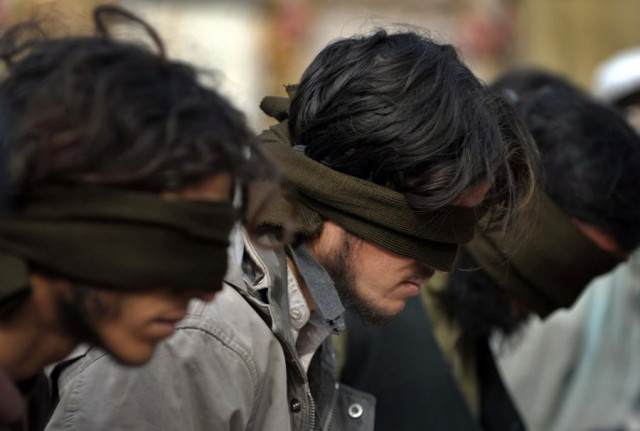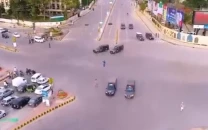De-radicalisation: Psychologists’ war against militants
Kayani has ordered to try capturing young terrorists rather than killing them.

The army is stepping up its new non-military strategy in the war on terror by using psychologists to fight militants.
Psychologists from around the world met this month in Pakistan to visit three ‘de-radicalisation’ facilities spread out in undisclosed locations in Swat Valley. The centres house Taliban and al Qaeda members who were captured during Operation Rah-e-Raast in 2009. The members have been in ‘de-radicalising rehab’ ever since.
At the de-radicalisation conference in Swat last week, Chief of Army Staff (COAS), General Ashfaq Parvez Kayani said, “There is no military solution to terrorism”.
Prime Minister Yousaf Raza Gilani said that Pakistan needs America to allow them space to manoeuvre and handle the terrorists, without international pressure. Gilani said America’s actions – referring to drone strikes – have adversely affected Pakistan’s non-violent strategies to counter terrorism.
Many of the boys at the camps surrender. They walk out in front of tanks during tough battles and give themselves up. The majority are children and teenagers. The rest are apprehended by the military during post-operation sweeps.
A military representative at Phytiom centre said the Taliban exploit most of these boys, because they are young, poor, and illiterate. For this reason, Gen Kayani put forth the order to try capturing, rather than killing them.
Leading clinical and neurophysiologist Dr Feriha Peracha, of Hum Pakistani Foundation, a Lahore-based NGO that funds the military project, said, “Most of these boys were abused by the Taliban, many of them have injuries, nightmares or trauma.”
In Sabooan, the centre where Dr Peracha focuses her work, there is an emphasis on treating the ‘beneficiaries’, with dignity. In the foyer of Sabooan where most of the children were trained to be suicide bombers, there is a wall of “before and after” photos of the children, from induction day to present day.
In one case, there is a picture of an expressionless little boy whose arm was blown off at the shoulder. The after picture, three years later, shows him smiling brightly with his special prosthetic attached, hardly recognisable from the induction, before photo.
Dr Peracha explained that this boy had been “involved in very serious military activity”, after being recruited into the Taliban by an uncle. During counter-insurgency, he lost his arm so the Taliban dumped him. He was later picked up by the military and brought to the centre.
Cases like his, for reintroduction, will be much more sensitive. Dr Zebulon Taintor, a professor of psychiatry at the New York University School of Medicine, who attended the conference, has suggested support groups as part of their reintroduction plan.
In Sabooan, Abbas, a nine-year-old trained suicide bomber was approached when he was playing in a field. The three men later came to his house and preached to him in his family’s living room. Both his parent’s are migrant workers in Dubai so he dropped out of school and joined the Taliban.
Abbas said he believed there was no value in life on earth, only in heaven, but now he said, “I’m so glad I did not become a suicide bomber because I am going to be a computer programmer.” Abbas does not remember what month his 12th birthday falls on, but says he celebrates every day, “like it is my birthday”.
At Phytiom the men are older, have experienced longer periods in war zones and are more radical. Interviewees gave pageant answers that were clearly rehearsed like, “I was lost”, “I was misled by the Taliban” and the “Pakistan government is doing everything right.”
However, a few were more forthcoming. During an interview with Express 24/7, one man said he lost his passion for the Taliban after travelling over the border to Afghanistan to fight Nato troops. In one incident, two women were dragged out onto the streets and beheaded.
When asked if he missed anybody from the Taliban, he said, “I miss my commander, but he does not understand, my Taliban brothers are brutes, they are not Islam.”
The research gathered from the centres showed most had dropped out of school at grade 10. Dr Peracha says one way to combat terrorism is to address the dropout factor.
Dr Sara Savage, of the Psychology and Religion research group at Cambridge University has developed a psychological therapeutic approach to extremism called integrative complexity which is currently being used in the UK.
“This is a human, not a religious problem,” said Dr Savage said, adding that “low complexity” thinking is where radicalisation is able to cultivate. IC builds resilience against binary vision, which Dr Savage describes as the human capacity to understand concepts only in terms of “black and white”, or “us and them”.
Accordingly, Dr Peracha, who is now working with Dr Savage, estimates that in Swat Valley alone there are approximately 5,000 boys who fit this profile and are hence, subjects for being targeted by the Taliban and al Qaeda.
Inside sources reveal that hundreds of militants from Kurram and Mohmand operations will be transported to the centres. About 800 de-radicalised militants will be reintroduced to society, from the de-radicalisation centres, before 2012.
Dr Peracha said, “These children will make the change, for every child I de-radicalize I expect, by extension, to reach a hundred more.”
WATCH THE PROCESS OF DE-RADICALISATION IN ACTION ON EXPRESS TV EVENING HOUR WITH KIRSTEN SEYMOUR.
Published in The Express Tribune, July 17th, 2011.



















COMMENTS
Comments are moderated and generally will be posted if they are on-topic and not abusive.
For more information, please see our Comments FAQ